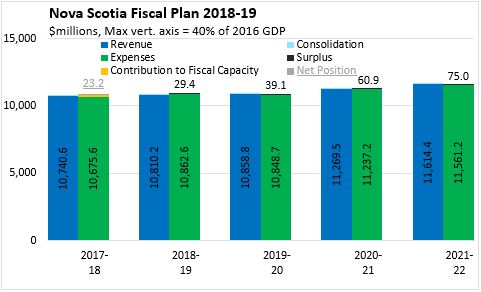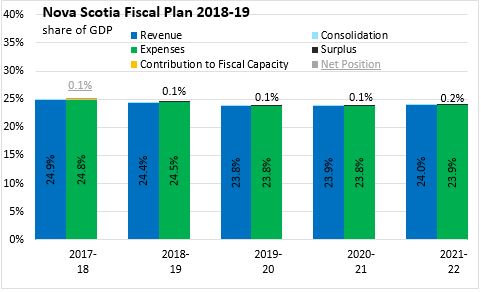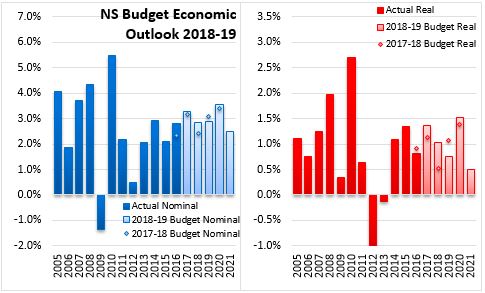The Economics and Statistics Division maintains archives of previous publications for accountability purposes, but makes no updates to keep these documents current with the latest data revisions from Statistics Canada. As a result, information in older documents may not be accurate. Please exercise caution when referring to older documents. For the latest information and historical data, please contact the individual listed to the right.
<--- Return to Archive
For additional information relating to this article, please contact:
March 20, 2018NOVA SCOTIA BUDGET 2018-19 Nova Scotia's 2018-19 Budget projects a surplus of $29.4 million for 2018-19, with surpluses rising to $75 million over subsequent years. The surplus for 2017-18 is forecast to be $131.6 million, with a net position of $23.2 million after a $110.3 million contribution to fiscal capacity for the Provincial Health Complex.

Revenues for 2017-18 were increased by one-time offshore revenues, allowing for additional investments to expand high-speed internet services as well as research and innovation, post secondary research in oceans, clean energy, health, sport/recreation/events and services for those who need specific supports. From 2018-19 to 2021-22, the level of surplus grows as revenue growth outpaces expenditure growth.

Measured as a share of provincial nominal GDP, Nova Scotia's surpluses amount to between 0.1 and 0.2 per cent of total income. Provincial revenues are projected to decline from 24.9 per cent of GDP in 2017-18 to 24.0 per cent of GDP by 2021-22. Provincial expenditures are projected to decline from 24.8 per cent of GDP in 2017-18 to 23.9 per cent of GDP in 2021-22.

Nova Scotia's recent economic growth has been based on rising business sector productivity outweighing the impacts of changing demography. However, Nova Scotia's economic growth was stronger than originally projected for 2017, with rising labour force, employment, wages, retail sales, residential construction, major project expenditures and exports combining to lift real GDP growth to an estimated 1.4 per cent (nominal: 3.3 per cent). With some major projects reaching conclusion, real GDP growth is expected to slow to 1.0 per cent in 2018 and to 0.8 per cent in 2019 (nominal: 2.9 per cent per year).

Key Measures and Initiatives
Nova Scotia's 2018–19 Budget focuses on strengthening important services and supports in four priority areas: health care, education and early years, safe and connected communities, and inclusive economic growth.
Budget investments in health care include:
- $19.6 million in additional funding to recruit, retain and train more doctors
- $8 million more for new and expanded collaborative care teams
- $8.8 million to provide 350 more hip and knee surgeries, create a central booking process and hire more surgeons
- $2.9 million more for mental health care
- $1 million for youth health centres
- $1.2 million increase in the Take Home Cancer Therapies program
- $5.5 million more to help seniors stay in their homes longer
- upgraded health-care facilities to support the QEII redevelopment project
Budget investments in education and early years include:
- $17.6 million to add about 130 new pre-primary classes
- $15.5 million to add new child-care spaces and to offer more subsidies
- $10 million increase to implement new recommendations from the Council to Improve Classroom Conditions
- $15 million to begin implementing recommendations of the Commission on Inclusive Education
- $1.6 million more to expand SchoolsPlus into 54 more schools
- $3.3 million increase to expand Reading Recovery
- opening four skilled trades centres
- continue work on school construction
Budget investments in safe and connected communities include:
- $16.2 million increase in Disability Support Program and to fund more complex client cases
- $2.1 million to help create small options and community options homes
- $3 million to double the poverty reduction credit to $500
- $4 million for initiatives under the Blueprint to End Poverty
- $3.4 million to fully exempt child-support payments from income assistance calculations
- $2 million to help prevent domestic violence
- $12.4 million more to improve public housing buildings
- $3 million to offer 400 more rent supplements to low income Nova Scotians
- $60 million more for a total of $285 million in capital spending on highways, bridges and roads, which includes $10 million more to improve gravel roads for a total of $20 million
- work on three significant highway twinning projects and four new highway interchanges
- $2.4 million more to expand and support community transportation
Budget investments in inclusive economic growth include:
- $1.7 million to further expand the Graduate to Opportunity program to connect new graduates to employers, with added incentives for hiring diverse graduates and women in non-traditional career
- $500,000 more for startup comany incubators and accelerators
- $356,000 to help an additional 89 student interns (total of 250 placements)
- $1.5 million more to enhance work incentives for people receiving income assistance
- $460,000 increase to help international immigration marketing and recruitment efforts
- $485,000 to create a market readiness program for startup companies
- $2.5 million more for the Innovation Rebate program to encourage private sector investment in capital projects
- $3 million for the Centre for Ocean Ventures Entrepreneurship (COVE) project to foster innovation in the ocean sector
- $3 million for the new Building Tomorrow Fund to support innovation in agriculture, fisheries and aquaculture sectors
- $5.8 million added to the Atlantic Fisheries Fund, in partnership with the federal government and the other Atlantic Canadian provinces
Budget 2018-19 also includes a new Capital Plan, which invests $605 million in roads, schools, health-care facilities and other public infrastructure.
Nova Scotia Budget 2018-19
<--- Return to Archive